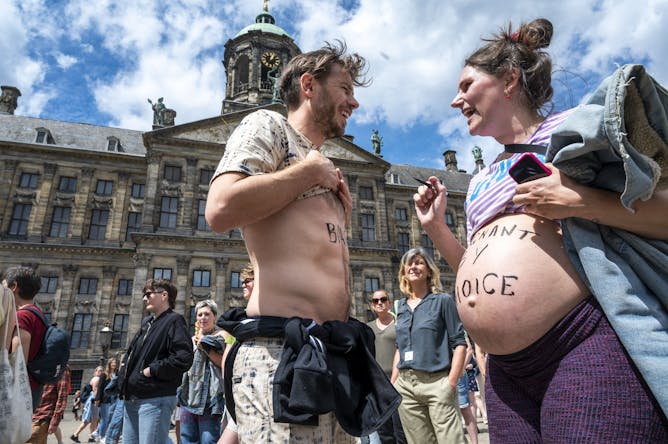|
An estimated 40 million women in the U.S. will not be able to get an abortion in the state where they live following the Supreme Court’s Dobbs v. Jackson Women’s Health Organization ruling. But as many U.S. states push to restrict access to abortion, most countries – rich and poor alike – have actually been making it easier to get the procedure.
Martha Davis, a legal scholar who studies worldwide abortion trends, explains what’s behind the wave of laws that have liberalized access in 30 countries since 2000. And unlike past Supreme Court rulings, Dobbs is unlikely to have much global influence, she adds.
“In fact, the Dobbs decision may serve to further isolate the U.S. and undermine its credibility as a global leader on women’s rights,” Davis writes.
Also today:
|

In most countries, like the Netherlands, it has become easier to get a legal, safe abortion over the last two decades.
Evert Elzinga/ANP/AFP via Getty Images
Martha Davis, Northeastern University
Only 24 countries today totally ban abortion. The Dobbs v. Jackson Women’s Health Organization decision in the US is unlikely to lead other countries to join that list.
|
Environment + Energy
|
-
Matthew E. Kahn, USC Dornsife College of Letters, Arts and Sciences
A 1972 report warned that unchecked consumption could crater the world economy by 2100. Fifty years and much debate later, can humanity innovate quickly enough to avoid that fate?
-
Yuyu Zhou, Iowa State University
Artificial light is upending trees’ ability to use the natural day-night cycle as a signal of seasonal change.
|
|
Arts + Culture
|
-
Frank T. McAndrew, Knox College
Study after study has shown that men tend to be more willing to put themselves in harm’s way to help others. Why some men rise to the occasion – and others don’t – has been a bit trickier to pin down.
|
|
Science + Technology
|
-
Benjamin Kaveladze, University of California, Irvine; Jonathan Schooler, University of California Santa Barbara; Oliver Sng, University of California, Irvine
It’s not logical to believe your relationship is “meant to be.” But believing in destined love may have evolved as a way to keep couples together long enough to reproduce and raise children.
|
|
Ethics + Religion
|
-
Robert Launay, Northwestern University
The fundamental issue at stake in abortion debates is personhood, which is viewed differently around the world, an anthropologist writes.
|
|
Politics + Society
|
-
Jeffrey Fields, USC Dornsife College of Letters, Arts and Sciences
Joe Biden is set to make his first visit as president to the Middle East, during which he will meet the Saudi crown prince the US accuses of ordering the murder of a journalist.
|
|
Education
|
-
Zahilyn D. Roche Allred, Florida International University
College science classes often fall short of helping students see connections across subjects. Can a new approach make a difference?
|
|